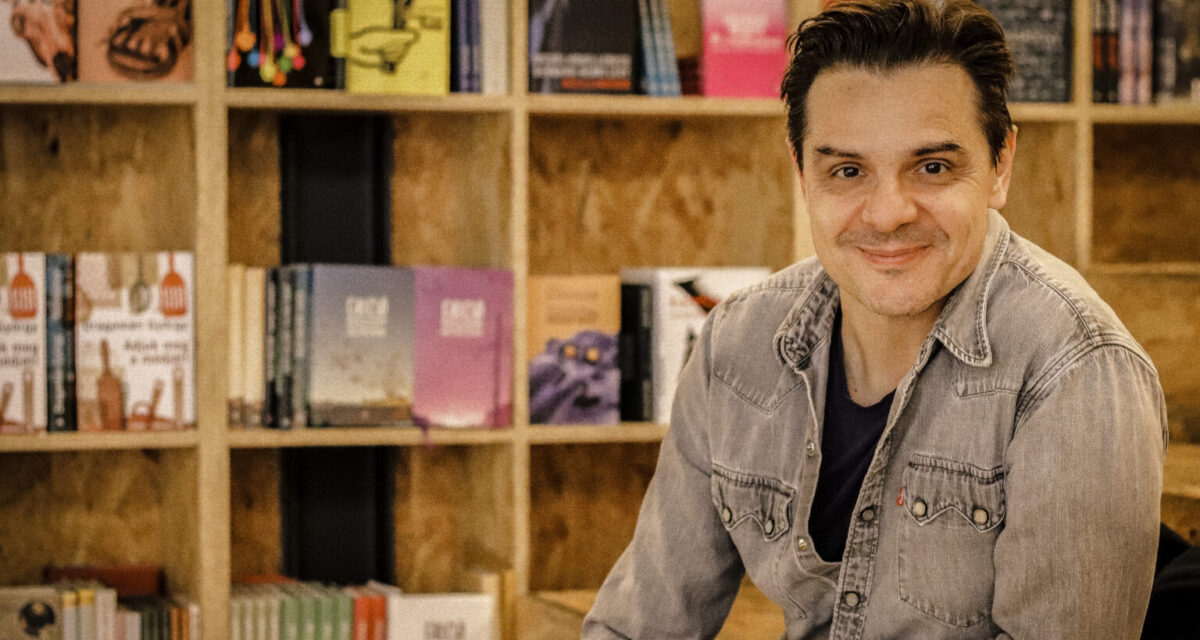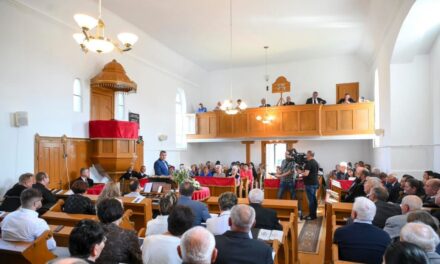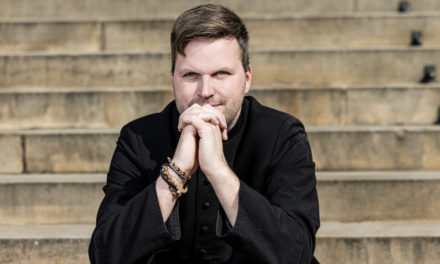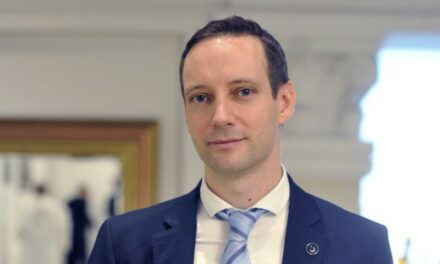I thought it was blasphemous and anti-Christian, and in addition, hundreds of words from the Bible were spoken in the performance, all misinterpreted by the character of the play. My faith did not allow me to participate in this. Interview with actor Zoltán Rajkai.
He comes to the interview with a rollerblade and headphones, with an energy that any young person would envy. Zoltán Rajkai has been playing in the company of the József Katona Theater for more than thirty years, and we have also seen him in several series and films. His conversion is connected to a Reformed church: they reached Pasarét when they were looking for a wedding venue with his bride - to whom he has been married for 26 years.
As he says, the relationship with God can keep two people together in true love. He will soon be giving a presentation on the Ten Commandments, which he believes is what we should be returning to in today's seemingly disintegrating world.
Since you have been an actor for several decades, the question arises in my mind, what is it that you can only experience in the theater and not anywhere else? What do you really like about it?
Acting is a very rich field - in terms of experiences, knowledge, recognition, and in general, it affects all areas of life. I am not confined to a specific topic or task in my work, but can wander into all kinds of areas in connection with a play.
The other is that the arts, especially the performing arts, deal with the entirety of life, with everything that encompasses life: characters, characters, relationships, processes, stories. All this in a very diverse way, in ages, in time, in space: this is a unique thing. It is so good to deal with the genre of opera, people of an ancient era, a character about whom our historical knowledge tells us something, but still needs to be personified in the present, in connection with, say, the coronation of Poppea. After that, two months pass, and then suddenly we deal with, say, the play Lonely People, where the crises and struggles of completely different people of a completely different era are at the center.
So the theater is very rich and varied, which is a huge source of ammunition.
I am an actor who tries to delve deeper into the subject, era, and people surrounding the task in connection with a role, I read up and look for other sources. We also used to jokingly say, in connection with one of these trial processes in some unusual stage situation, that a cashier of a bank or an administrator of a multi-purpose company would not experience such a thing during their work.
The course itself suits me very well, I have always been a lively person, and from the beginning I was captivated by this kind of variety, richness, and curiosity.
Not to mention that we have traveled a lot with the Katona József Sznház in the last thirty years, we have visited almost all parts of the world, from Moscow to Sydney, from New York to South America. I never thought that as a Hungarian actor I would reach so many places in the world in relation to theater art.
Were there any characters you played that were particularly close to you?
Acting is very interesting, because there are roles that you don't struggle with so much, they don't seem like a big task for you. It seems like you can do it with little fingers, it seems so simple and self-evident, and then it becomes a very big success. And there are roles that torment him, he works a lot with them, he feels that it was a boundary crossing in his own creative career, and those will not have results, they are not so successful. I never had dreams of acting. Maybe I was attracted to Hamlet and similar roles at a very young age, but obviously that's just because of fashion, because everyone wants to play them.
Have you ever turned down a role because it conflicted with your values?
Yes, there was only one such play, The Martyrs, whose meaning, purpose, and content were unacceptable to me as a believing Christian. With that, I went to Katona's director, Gábor Máté, and said that I could not accept the claims of the play because of my faith, and therefore I did not want to play in it. This was accepted by the director of the play, András Dömötör, and the director, although they did not agree with me regarding my arguments, but they understood that this was important to me and did not want to force me to do anything.
There is no retort or postponement for this.
The play is about a teenage boy with sexual and all kinds of other problems during puberty, who takes the Bible off the shelf and, through what he finds in it, becomes the leader of a religious sect. In fact, the Holy Scriptures spur him on to such radical actions that he wants to destroy his Jewish teacher, he becomes a quasi-Nazi.
Anyone who knows the Bible even a little or has dealt with it more deeply knows that such a thing cannot exist.
I am convinced that if someone just takes the Bible off the shelf at home, alone, and starts reading, two things can happen to him: either he doesn't understand it at all, thinks it's boring, strange, fairy-tale-like, and puts it back on the shelf, or the word affects him, he becomes interested , and starts on the path of Christianity. You will definitely look for a community, a church, a congregation where you can get an answer to the question of your size.
And his further religious life depends on that community: so either he continues on the path of sanctification, or he may join a sect where there are false teachings and there, as a result of the community, someone can really become radicalized like the young man in the play.
But then the letter of the Holy Scriptures is no longer authoritative, but the manipulation of a distorted community, where the Bible is only used as an excuse. I objected to this in the piece. Reading the Word alone will never take anyone to such extremes, it requires community. So, I thought this premise of the play to be benevolently ignorant, or worse, provocative, but in any case
I thought it was blasphemous and anti-Christian, and in addition, hundreds of words from the Bible were spoken in the performance, all misinterpreted by the character of the play. My faith did not allow me to participate in this.
If you're saying no, I think you've also been approached several times to appear in shows - but you can't be seen in them, nor in the tabloids. Did you decide at the beginning of your career that only theater would be the focus?
When I started this career, there was no such thing as tabloids, but somehow around the time of the regime change, in the late eighties and early nineties, television programs and the media, and then some theaters as well - obviously economic consideration - that the scissors opened up: the more demanding artistic works and the demanding or less demanding boulevard became two separate genres. I knew and decided that I didn't just want to develop in the entertainment industry.
Some people love this world and find their place in it, but I never felt the urge to do so.
Thank God, the TV series or movies that I was able to participate in were all above a certain professional standard and I don't feel that I should be ashamed of them in any way.
Can you recall a moment or period in your life when you decided to give your life to Christ?
I used to say that in order to be a good actor and a really great artist, you have to experience all kinds of things, you have to push your limits. I really started to push these things: drugs, women's issues, questioning social conventions. I wasn't much of a rebel, but I started to become deviant in terms of my intentions.
These imagined aspirations pushed me lower and lower, because even though something happened to me that was good to talk about, in reality the consequences made me worse and worse, both mentally and physically.
The internal tension was also growing in me. My girlfriend at the time - who is now my wife - and I met in high school, it was a very pure and true love relationship back then, and it also got dirty in the search for an artistic path, in a rather miserable way. In the end, I came to the point that we should somehow try to fix our relationship. This entire phase lasted for ten years, and I thought that the solution to this mental crisis and set of problems might be to get married. We started looking for churches to have the wedding. Since we were both baptized Catholics, we went to all kinds of Catholic churches, but only because we wanted to have a beautiful setting for the big day.
In the end, we docked at the Torockó tér Reformed Church, because my fiancee showed me an article from Nők Lapja about how an alcoholic couple was cured of their alcoholism, and how their relationship got back on track.
It was a very convincing and beautiful story, so we contacted the Pasaréti Reformed Church, where Kálmán Cseri was the senior pastor at the time. We wandered into his service, which had a great impact on me. It dawned on me that this whole search for a way, the tensions, the contradictions are the consequences of sin, even though I didn't even know such concepts back then.
You just felt something was wrong.
Yes, but then suddenly everything fell into place there, already during the first service. It was very personal, it spoke to me, it touched me. We started going to the Torockó tér church and eventually got married there, in a Puritan Reformed church.
From the time I set foot in the church, about a year passed when
I consciously said that I wanted to live my life in faith as a disciple of Jesus Christ.
I was able to lay down my sins, I was able to piece together what had happened to me until then. It was a real turning point, my life took a 180 degree turn. I converted.
Coupled with this were some very strong vision-like events, through which I gained certainty that what the Bible says about God, the Holy Trinity, Jesus, redemption, the afterlife, and heaven is all true. I'm not saying that such visions are the conditions for a person to truly walk in faith, they don't have to happen to them, in fact, I would warn anyone who has something like this to be careful, but for me it was affirming. Since then, I have had no doubt that the Scriptures are true.
The full interview can be read HERE!
Source: 777blog
Featured image: 777blog/Flóra Katona













